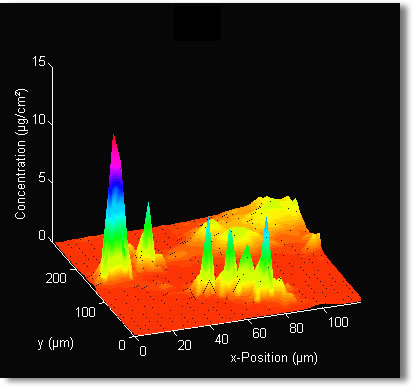
![]()
The lack of quantitive tools has traditionally hindered proteomics studies. Quantitive studies using 2D SDS-PAGE gels are technically difficult, and are often biased against particular protein classes such as low abundance regulatory proteins. Several new gel free high throughput quantitation strategies have recently been developed to analyze protein abundance in a systematic manner (that is the relative quantities of proteins will be compared from one state to another) as is routinely done in microarray experiments.
The Emili group has developed a combined experimental strategy for automated, high throughput protein identification and quantitation usig MS, termed Mass-Coded Abundance Tagging (MCAT). The approach is based on differential post-experiment labeling of tryptic peptides followed by capillary scae liquid chromatography electrospray tandem mass spectrometry (LC-MS/MS). MCAT provides a means for sequencing of proteins present at low levels in complex biological mixtures and for comparing the relative abundance of proteins present in various cell states in a systematic, reproducible and straightforward manner.
The MCAT approach is being used to examine the protein response or profile of experimentally perturbed cells. The protein profiling efforts have both a qualitative and a quantitative component such that each profile generated can be directly compared to other profiles present in a reference database. We anticipate that three sources of biological samples will be analyzed by mass spectrometry: tissue culture models of physiology, animal models of development and disease, and eventually clinical samples such as serum. Together with mRNA expression studies, these profiling efforts should provide mathematically tractable molecular descriptions of cell states that can serve as readouts of cell behaviour, active molecular processes and drug responses, and their relation to genotype, phenotype, and patient outcome (clinical data) - something most current studies lack.
One aim of the Proteomics Research Center is to perform comprehensive proteomics and bioinformatics studies to identify the regulation of protein abundance during cell growth, division and differentiation. In particular, we will use MCAT profiling coupled to ultra-sensitive tandem mass spectrometers and sophisticated software to evaluate the dynamics of protein turnover within during a eukaryotic cell cycle to gain insights into the molecular mechanisms that underlie cell division. Such studies will impact our understanding of basic human cell biology, health and development.
